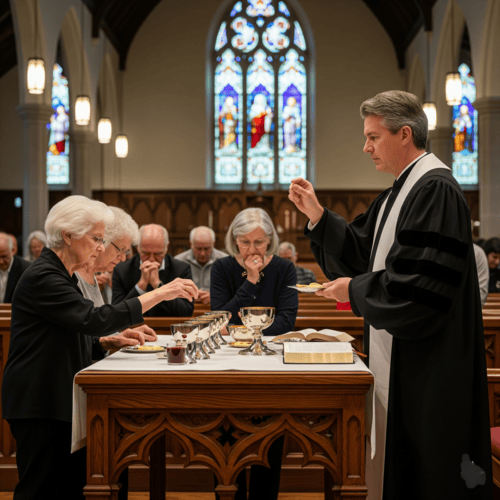Fencing the Lord’s Table: Why Scripture Supports Careful Communion
The Lord’s Supper is both Christianity’s sweetest invitation and its most sobering warning. Week after week, pastors across Reformed churches issue what sounds like an exclusion: “Let all who have not made public profession of faith abstain.” Yet this practice—known as “fencing the table”—isn’t rooted in exclusivity but in love. Scripture provides clear warrant for careful examination before communion, not to keep people out, but to protect both the church and individual souls from spiritual harm.
THE APOSTOLIC WARNING: A MATTER OF LIFE AND DEATH
Paul’s words to the Corinthians cut through any casual approach to communion with surgical precision: “Whoever, therefore, eats the bread or drinks the cup of the Lord in an unworthy manner will be guilty concerning the body and blood of the Lord” (1 Corinthians 11:27). This isn’t mere ceremonial impropriety—Paul describes someone becoming “guilty concerning the body and blood of the Lord.” This is language that echoes the charges brought against Christ’s crucifiers.
The stakes couldn’t be higher. Paul continues: “For anyone who eats and drinks without discerning the body eats and drinks judgement on himself. That is why many of you are weak and ill, and some have died” (vv. 29-30). Physical weakness, illness, and even death had befallen the Corinthian church because of unworthy participation in the Lord’s Supper. This wasn’t coincidence—it was divine discipline.
The Corinthian context reveals the danger. Their communion had devolved into division and disorder. The wealthy gorged themselves while the poor went hungry (vv. 21-22). They had turned Christ’s memorial into a monument to their own selfishness. Paul’s response wasn’t to abolish communion but to demand careful self-examination: “Let a person examine himself, then, and so eat of the bread and drink of the cup” (v. 28).
The Westminster Confession captures this biblical concern perfectly: “ignorant and wicked men” who receive the sacraments unworthily “become guilty of the body and blood of the Lord to their own damnation” (29.8). This isn’t Reformed harshness—it’s apostolic faithfulness to Paul’s explicit warnings.
BIBLICAL PREREQUISITES: MORE THAN GOOD INTENTIONS
Scripture establishes clear prerequisites for worthy participation that go far beyond mere sincerity.
- First, self-examination is commanded, not suggested (1 Corinthians 11:28). This requires genuine knowledge of the gospel—understanding that communion proclaims “the Lord’s death until he comes” (v. 26). Without grasping Christ’s substitutionary sacrifice, the bread and wine become meaningless ritual.
- Second, faith proves equally essential. “Without faith it is impossible to please God” (Hebrews 11:6), and communion represents the ultimate act of faith—feeding on Christ spiritually through the physical elements. Mere intellectual assent falls tragically short. The communicant must personally trust in Christ’s finished work.
- Repentance forms the third pillar. Jesus instituted the Lord’s Supper on the night of His betrayal, breaking bread with disciples who would soon abandon Him. Yet He chose those who, despite their failures, had hearts oriented toward Him. Communion isn’t for the sinless—it’s for the repentant.
Paul’s phrase “discerning the body” (1 Corinthians 11:29) encompasses both recognising Christ’s sacrifice and understanding communion with fellow believers. The Lord’s Supper isn’t a private devotional but a covenant meal binding the church together. Participating without regard for church unity—as the Corinthians demonstrated—brings judgement rather than blessing.
Church membership and discipline provide the biblical context for these requirements. Jesus’ instructions about church discipline culminate in treating the unrepentant “as a Gentile and a tax collector” (Matthew 18:17)—excluded from covenant privileges. Paul commands the Corinthians not even to eat with impenitent sinners claiming Christian identity (1 Corinthians 5:11-13). If ordinary meals were restricted, how much more the sacred supper?
HISTORICAL FAITHFULNESS: STANDING ON SOLID GROUND
Reformed churches didn’t invent communion fencing—they inherited it from Scripture and refined it through careful theological reflection. Calvin’s Geneva required preparation services where pastors examined communicants’ understanding and spiritual condition. This wasn’t bureaucratic control but pastoral care, ensuring people approached the table with proper knowledge and heart preparation.
The Westminster Standards codified these practices, establishing clear boundaries for participation while emphasising the church’s teaching responsibility. The Directory for Public Worship specified ministers should “warn all such as are ignorant, scandalous, profane, or who live in any sin or offense against their knowledge or the Christian profession” to abstain from communion.
Scottish Presbyterians even developed the communion token system—physical evidence that the bearer had undergone pastoral examination and was prepared for participation. Far from exclusionary legalism, this represented intensive pastoral care, often involving weeks of preparatory services, doctrinal instruction, and personal examination.
ADDRESSING OBJECTIONS: WITH GRACE AND TRUTH
“Didn’t Jesus Himself eat with sinners?” Critics often invoke Jesus’ practice of eating with sinners, but this misses a crucial distinction. Christ’s pre-crucifixion meals served evangelistic purposes—reaching the lost with gospel invitation. The post-resurrection communion ordinance serves different purposes—memorial, proclamation, and covenant renewal among believers. Conflating these categories undermines both evangelism and church order.
“Aren’t you excluding the needy?” Others worry about “excluding the needy” from communion, but biblical fencing protects rather than rejects. A loving parent doesn’t allow a child to play in traffic—not from cruelty but from care. Similarly, pastors who warn unprepared souls against dangerous participation demonstrate love, not legalism. The goal isn’t permanent exclusion but proper preparation.
“Aren’t you judging?” Concerns about “judging hearts” miss Scripture’s clear mandate for churches to exercise discernment. Jesus commanded evaluation by fruits (Matthew 7:16), and He gave church leaders “keys of the kingdom” authority (Matthew 16:19). Churches must judge outward profession and visible fruit—not to condemn souls but to guard Christ’s ordinances.
LOVING APPLICATION: PASTORAL WISDOM IN PRACTICE
Biblical fencing requires clear, gracious communication. Congregations need regular instruction about communion’s meaning and requirements. The goal isn’t surprising visitors with unexpected restrictions but preparing hearts for meaningful participation. Advance explanation transforms potential offense into opportunity for gospel clarity.
Pastoral care proves essential. Ministers should meet personally with inquirers, providing instruction and examining readiness. This isn’t interrogation but discipleship—helping people understand both their need for Christ and their readiness for covenant commitment. For excluded members, the focus remains restoration, not punishment.
SACRED LOVE IN ACTION
Scripture’s warrant for communion fencing couldn’t be clearer. Paul’s dire warnings about unworthy participation, combined with biblical prerequisites for meaningful communion, establish the church’s responsibility to guard the Lord’s Table. This isn’t religious gatekeeping but sacred love—protecting Christ’s honour, preserving church purity, and guarding individual souls from spiritual harm.
The motivation remains entirely pastoral. We fence the table not because we enjoy exclusion but because we fear the consequences of careless inclusion. We examine communicants not from suspicion but from concern. We maintain standards not from pride but from obedience to apostolic instruction.
“Let a person examine himself, then, and so eat of the bread and drink of the cup” (1 Corinthians 11:28). This examination—both personal and pastoral—ensures Christ’s memorial remains what He intended it to be: a feast of remembrance, proclamation, and communion for those who truly know and love Him.
FENCING THE LORD’S TABLE: RELATED FAQs
What do people who experienced God’s discipline after careless communion say about it? Historical accounts and pastoral testimonies reveal sobering warnings from those who participated unworthily. Many report experiencing sudden illness, spiritual darkness, or significant life trials immediately following communion, leading them to connect these events with Paul’s warnings in 1 Corinthians 11:30. Reformed pastor Richard Baxter documented cases of communicants who fell ill or died shortly after unworthy participation, which he attributed to divine discipline. The survivors often became the strongest advocates for careful examination, warning others never to approach the table lightly.
- Can someone be “too sinful” to take communion if they’re truly repentant? No sin is too great for a genuinely repentant believer to approach the Lord’s Table. The issue isn’t the magnitude of past sins but the present state of the heart—is there genuine repentance and faith? Even those guilty of serious scandals can participate once they’ve demonstrated authentic repentance through church discipline processes. The thief on the cross, had he lived, would have been welcomed at Christ’s table despite his criminal past.
- How did early church fathers view communion participation requirements? Church fathers like Chrysostom and Augustine strongly emphasised careful preparation and restricted participation. Chrysostom warned approaching communion unworthily was worse than crucifying Christ, since it showed contempt for His sacrifice. Augustine required catechumens to complete extensive preparation before first communion, and the early church developed elaborate fasting and confession protocols. The Didache, an early Christian manual, commanded only the baptised should partake, establishing precedent for membership requirements.
What about children of believing parents—when should they first commune? Reformed churches historically required children to demonstrate personal understanding of sin, salvation, and the sacrament’s meaning before first communion. This typically occurred around ages 10-14, but maturity mattered more than chronological age. Calvin insisted children must be able to examine themselves according to 1 Corinthians 11:28, while the Westminster Directory required sufficient knowledge to “discern the Lord’s body.” The focus remains on spiritual comprehension rather than arbitrary age limits.
- How do churches handle visitors who want to participate in communion? Most Reformed churches require visitors to speak with a pastor or elder before communion to verify their church membership, doctrinal agreement, and spiritual condition. Some provide visitor cards requesting basic information about church affiliation and faith. Churches typically explain their fencing practices in advance, emphasizing that restrictions stem from biblical concerns for spiritual welfare, not unfriendliness. Many offer to meet with sincere inquirers for instruction and preparation.
- What’s the difference between “close” and “closed” communion practices? “Close communion” restricts participation to baptised members of evangelical churches who affirm basic gospel truths and live in good standing with their congregations. “Closed communion” limits participation only to members of that specific denomination or even that particular congregation. Most Reformed churches practice “close” rather than “closed” communion, recognising faithful believers from other Bible-believing denominations. The distinction reflects different interpretations of church authority and sacramental theology.
How do churches restore excluded members to communion privileges? Restoration typically involves pastoral counselling, demonstrated repentance, and sometimes public acknowledgment of sin depending on the offense’s nature and scope. The excluded member must show genuine heart change, not merely regret for consequences. Church sessions (governing bodies) usually oversee the restoration process, which may include accountability relationships, biblical counselling, or specific acts of restitution. The goal is always restoration to full fellowship, including communion privileges, as evidence of God’s forgiveness and the church’s reconciling ministry.
FENCING THE LORD’S TABLE: OUR RELATED POSTS
Editor’s Pick

The Racial Diversity Question: Does the Bible Have Answers?
Walk into any bustling metropolis today and you'll likely witness humanity's breathtaking diversity—the deep ebony skin of a Sudanese family, [...]

Do Christians Need Holy Shrines? Why the Reformed Answer Is No
Walk into a medieval cathedral and you'll encounter ornate shrines, gilded reliquaries, and designated "holy places" where pilgrims gather to [...]

If God Is Sovereign, Why Bother Praying?
DOESN’T DIVINE SOVEREIGNTY OBVIATE PRAYER? **Editor’s Note: This post is part of our series, ‘Satan’s Lies: Common Deceptions in the [...]

I Want To Believe, But Can’t: What Do I Do?
"I want to believe in God. I really do. But I just can't seem to make it happen. I've tried [...]

BC 1446 or 1250: When Did the Exodus Really Happen?
WHY REFORMED SCHOLARS SUPPORT THE EARLY DATE Many a critic makes the claim: “Archaeology has disproven the biblical account [...]

Does God Know the Future? All of It, Perfectly?
Think about this: our prayers tell on us. Every time we ask God for something, we’re confessing—often without realising it—what [...]

Can Christian Couples Choose Permanent Birth Control?
Consider Sarah, whose fourth pregnancy nearly killed her due to severe pre-eclampsia, leaving her hospitalised for months. Or David and [...]

Bone of My Bones: Why Eve Was Created From Adam’s Body
"This at last is bone of my bones and flesh of my flesh!" Adam's joyful exclamation upon first seeing Eve [...]

Is Calvinism Fatalism in Christian Disguise? Think Again
We hear the taunt every now and then: "Calvinism is just fatalism dressed up in Christian jargon." Critics argue Reformed [...]

Can Churches Conduct Same-Sex Weddings?
In an era of rapid cultural change, churches across America face mounting pressure to redefine their understanding of marriage. As [...]





